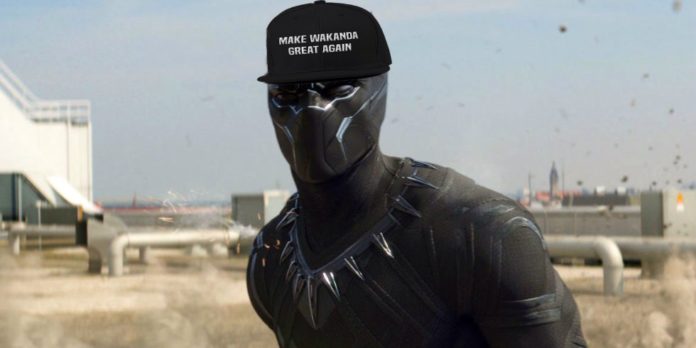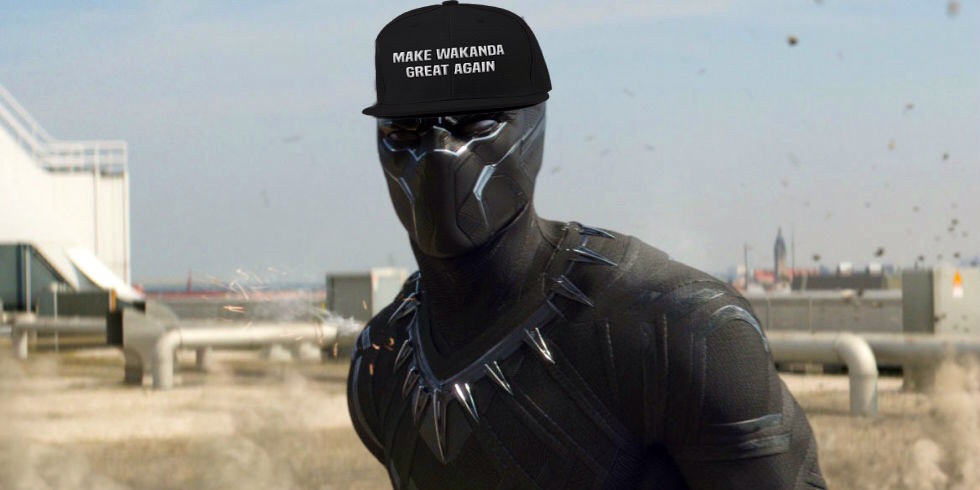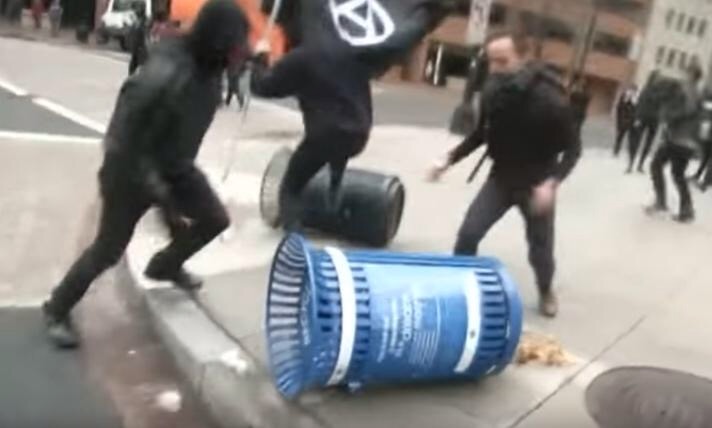There’s a lot of racism on the internet, and there are a lot of racist reviews / rants about Black Panther. This isn’t one of them.
In case you weren’t aware, this movie is a black movie. The director is black. All the main characters are black, if you don’t count a few extras, one bad guy who dies, and Bilbo, who is only there for cinematic universe continuity. Heck, even half the words in the title are black. Now as you know, your XYZ is deeply concerned about racism in our society and firmly committed never to give a platform to any viewpoint that would be offensive to any colored individual. Therefore, I am pleased to report that this film is the epitome of cinematic excellence. Your reaction to this film is not a judgement of the film, but an indictment of yourself.
If you haven’t seen this movie, go and see it, then come back, because there will be spoilers, and also because if you haven’t seen it yet you’re insanely racist. If you have, you should go and see it again just to make sure. With that out of the way, let’s review the movie and then examine why it deserved the Academy Award.
The film starts right where the third Avengers movie left off. The UN now requires the registration of all super-powered individuals, and any attempts to save the world must be vetted and approved by overseers, regardless of whether the superpowers are based on biology, technology, McGuffin stones, or steroids. Although our protagonist has been publically seen outrunning cars on the streets of Berlin, at no point in this movie does the UN bureaucracy interfere in his super-powered shenanigans in any way, because as we all know, making black people follow the law is racist.
The preliminary scene shows two black men who live in a downtrodden and disheveled black neighborhood discussing logistical issues in what appears to be their next criminal enterprise, because flouting the law is apparently the preferred occupation of black men. Their deliberations are disrupted by an unexpected visit by His Royal Blackness King T’Chaka and his regal retinue. At first glance, it appears racist to depict black men in this manner, but the scene is cut off by the Marvel logo and you have to wait until the second act to find out why it isn’t racist.
As the previous King was not wearing his vibranium plot amour when a truck of peace exploded in Avengers 3, the first act of this film shows the preparations for the coronation. Because black people are better, more advanced and just generally cooler than white people, they have a much more efficient system of selecting the next head of state than a messy divisive 18 month talkathon culminating in a vote for the winner. In Wakanda, the king is chosen by mortal combat in a shallow pool. If no one wants to fight, then . . . nah, of course someone wants to fight because this movie needs a plot. The leader of the Simian tribe challenges and loses. Although this may seem a little problematic, it actually isn’t, because the director is black, and black people can’t be racist.
It is at this point that we are shown glimpses of life in Wakanda, and it’s incredibly beautiful, as it is a depiction of what Africa could have been if white people didn’t destroy it. Not counting the bad guys, only royalty and fighter pilots have ranged deadly weapons. Everyone else has spears, swords, and giant rhinos. The citadel has vibranium skyscrapers and flying saucers and high speed trains with magical sonic thingumajigs that will deactivate the bad guy’s plot armour in the third act. Out on the overpopulated streets, citizens sell bling in thatched huts. In the rural areas, they use clay pots, stick fences, and the architecture looks suspiciously like wattle and daub. There are no tractors in this movie, even though they clearly have the technological capability to make every labor saving device you could think of. If you are a Nazi, you might call this structural inequality, but that isn’t the case because there are no white people in this society. You can’t have inequality without white people. What you are actually seeing is a proud and noble race holding fast to their ancient traditions, and if you criticize stone age traditions, you are a racist.
This part of the film doesn’t last very long though, because the new King is called to the situation room to decide whether to act on intelligence regarding the location of Gollum, a notorious enemy of the state. After some brief deliberations that do not take into account the welfare of civilians, the decision is made to conduct a military operation in South Korea. Obviously the South Korean government is totally cool with super-powered black people entering their country in stealth jets without permission or documentation, to engage in shootouts and high speed car chases with other foreign nationals, recklessly endangering the lives and private property of their people. It wasn’t shown on camera, but there were definitely dozens of deaths on that night from deflected bullets and car crashes, as well as extensive private property damage. A similar incident in the last movie caused Wakanda to lead the drive for bureaucratic regulation of all super-heroic activity, so you might think that South Korea should react in a similar fashion – if you were a racist. The truth is that if you want to be not racist, then you have to let black people flood into your country at will without any checks or balances, let them destroy whatever and whoever they want to destroy, clean up after them and then pretend like nothing happened. The South Korean government is not racist.
Gollum gets away, but it doesn’t matter because he is promptly shot dead by his henchman who, according to the reviews, is the most sympathetic Marvel villain and at easily the second best, probably best. He is black, and he really loves killing people for no apparent reason, up to and including his girlfriend. He believes in murder equality. He doesn’t care what skin color you have, he’ll kill you anyway if you cross him, so he’s not a racist.
In Wakanda, King T’Challa bullies a subordinate into divulging to him the backstory on Killmonger. You remember the pre-logo trailer at the beginning of the movie? It turns out that one of those black dudes was a Wakandan spy, and the father of Killmonger. The scriptwriters weren’t actually racist for starting the film with a depiction of black men conspiring to commit criminal activity you see, because the truth was that the leader of the two trying very hard to assimilate with the existing black culture. But the problem is that he is also guilty of high treason, and King T’chaka is there to arrest him – oops I meant to say – politely ask him to voluntarily return and inform the government of his crimes. (Arresting black people who have committed crimes is racist.) Killmonger Sr. proceeds to chuck a wobbly and long story short, Killmonger Jr. returns to his flat to find that his father dead on the floor, having been killed by another black man. I won’t hyperlink to statistics that show that this is the normative black experience because that would be racist.
Present day grown-up Killmonger Jr. is deeply troubled at the two billion black people in the world who are black and under the oppression of The White Man. The White Man only cares about The White Man, and created a society in which black boys like him grow up in dirt poor neighborhoods without their fathers. It can’t be easy to live with the constant fear of your unarmed friends being shot or clawed to death by law enforcement for attempting to shoot a cop. His solution is to join the army of The White Man, spend an extended period of time fighting the wars of The White Man and killing the enemies of The White Man, who are mostly not white. Having done all of that, he now plans to kill yet another colored man to obtain the Wakandan throne, so he can give overpowered weapons to other Black Lives Matter activists, who will burn the world to the ground and start over from scratch, because it worked out so well in Zimbabwe and South Africa. In a surprising and truly shocking plot twist never before seen in the history of cinema, the main character turns out to not be dead, even after being stabbed and thrown off a 200 foot cliff into the river below. Everyone spends rest of the movie negotiating the future foreign policy of Wakanda by . . . . well, let’s just say this film is rated M for action violence. Far be it from me to be so racist as to suggest that any of this is in any way uncivilized. Black people have the right to run their own black countries as they see fit, so who am I to judge? And if you don’t agree with me, just ask Captain America. Although we know from other movies that he is currently hiding from UN bureaucrats in Wakanda, he does not appear in this movie. His existence isn’t even mentioned. You see, Captain America understands that interfering in the internal governance of black communities is racist.
In the end, a compromise is forged. The protectionists get to keep their borders, and the expansionists get to expand with knowledge and technology rather than violence. The non-murdery T’challa gets be the King and Killmonger gets to watch a sunset. Wakanda does not go to war with the entire world and Trump does not in turn use his bigger better button to transform Wakanda into an irradiated wasteland inhabited by nothing besides racist American mining robots.
On the whole, this movie was incredibly entertaining, and I can’t wait for the sequel where Wakanda, as a newly revealed global power, destabilizes the value of the petro-dollar by creating a new vibranium backed currency, and then gets liberated by the Americans for having weapons of mass destruction. (Or maybe just the theoretical capacity to produce them. Don’t be pedantic; it’s prettymuch the exact same thing.)
This movie will be regarded as one of the greatest films of all time for three reasons.
Firstly, black people are given an image of what they could have had if The White Man didn’t completely deplete Africa of all the natural resources of value and enslave billions of the black people.
Secondly, the White Man is given an image of how to not be racist. As previously mentioned, the South Koreans in this movie are a shining beacon of progressive tolerance that all white people should aspire to emulate.
Thirdly, and most importantly, this movie unites us in a way that no other film has ever united anyone before. Trump voters love Black Panther because they love utopian nationalist countries with strong borders guarded by masculine men. Marxists love Black Panther because they love all forms of nationalism except when white people do it, because when white people do it, it’s the final solution. Everyone who doesn’t fall into either of these categories loves this movie because YOU HAVE TO OR ELSE.
The fact that Black Panther did not win best picture is an outrageous disgrace, and you should be outraged. Now to be fair, the film that did win best picture was about a woman having a sexual relationship with a fish that was imprisoned in her lab. I have to admit, cross-species sex with a massive power imbalance is pretty darn progressive. However, it had still had a lot of white people with guns who worked for the government, and the injustice of white people having their own country and governing their own affairs was at no point addressed.
To stop outrageous snubs like this from being repeated, join your local antifa. Take the fight to the ones truly responsible. The only good racist trashcan is a dead racist trashcan.












